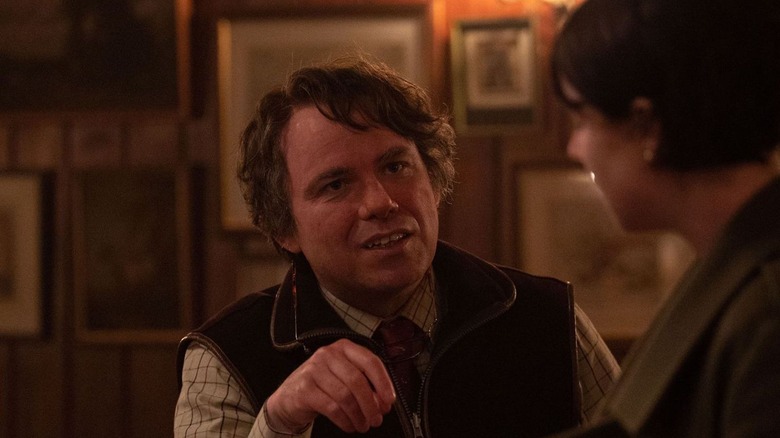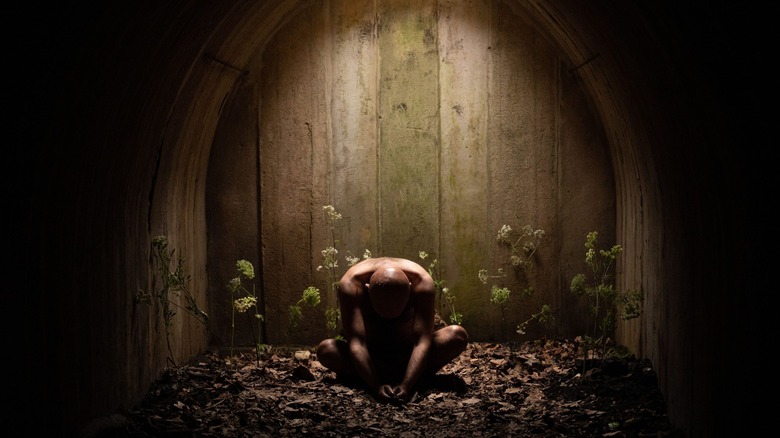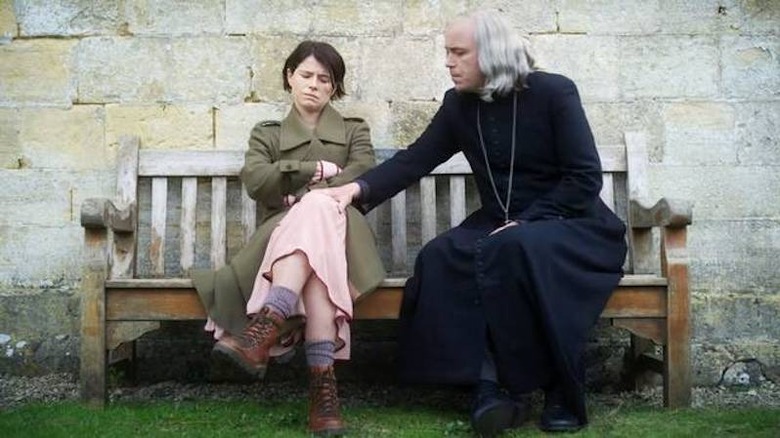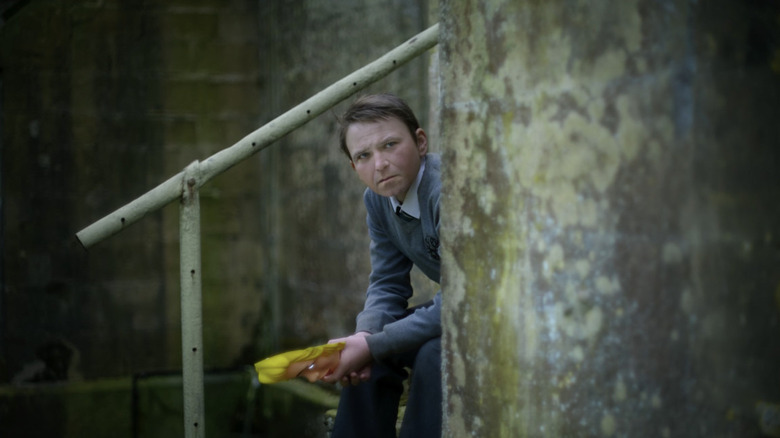Rory Kinnear On Playing All The Men Of Alex Garland's Men [Interview]
Rory Kinnear is a man of many faces. Or in the case of "Men," he's many men of one face.
In Alex Garland's cryptic new film, Kinnear plays at least 90% of the cast, appearing as the face of multiple men (and one boy) encountered by Jessie Buckley's Harper when she takes a trip to a rural cottage in an attempt to get some distance from a deeply traumatic event.
Kinnear first appears as Geoffrey, the peculiar owner of the beautiful cottage Harper has rented out for a few days. But then he appears as a naked man who seems to stalk Harper, before then showing up as a police officer, a vicar, a pub owner, and a young boy. It's a disorienting experience to see, but less so to perform, as Kinnear told /Film in a phone interview ahead of the release of "Men."
"I think [it was] probably more crazy for Jessie than necessarily for me because I was able to sort of concentrate on each one that I was doing," Kinnear said of playing all the men in, well, "Men." He added, "I'd created biographies for each one, even if I knew one was only going to be ... had a minimal amount of screen time."
I chatted with Kinnear on creating the various men of "Men," parsing the maddening ambiguity of the film, and what it was like performing that bonkers final sequence.
Potential spoilers for "Men" follow.
'Obviously each character, you can't play a theme or you can't play an archetype.'
Fantastic performance — or performances, I have to say. You play multiple characters in Men who appear to exclusively populate this village that is attacking Jessie Buckley's Harper. Which was the most challenging character for you to play?
Well, what was the most challenging? I guess it was more like, which were the more sort of challenging sequences? What was nice about the process is, having been attached to it for several months, that one had had the time to sort of investigate and create all the different characters, hopefully with the same level of sort of depth and integrity as each one. So I'd created biographies for each one, even if I knew one was only going to [have] a minimal amount of screen time, you wanted them not to leap out as not being as connected as the others. So obviously the pub sequence was challenging because you were playing multiple people in the same day and having to sort of keep your head and wits around you, and not let one character bleed into the next.
And also you had stand-ins playing the other characters, so that was a sort of "Inception"-style mind bend to try and ... But I think probably more crazy for Jessie than necessarily for me because I was able to sort of concentrate on each one that I was doing. And then obviously the final sequence was a challenge in lots of different ways. Mainly comfort, but also make sure that you were delivering something that, even though it was nonverbal and pretty sort of hallucinogenic in lots of ways, was also sort of grounded in something that you had to create for yourself.
Men is an incredibly ambiguous film, and your characters are at the center of that ambiguity. Was it difficult to play into that ambiguity while maintaining the differences between the characters?
Yeah, no. I mean, obviously, when you read it, you sort of knew what Alex was trying to achieve — well, not necessarily trying to achieve — but the richness of the tapestry that he was trying to provoke, and some of the themes and the questions that he was trying to provoke answers to, or at least to get a response from an audience that would have a multiplicity of responses. But obviously each character, you can't play a theme or you can't play an archetype. You have to play their day and their moment and who they are. So whilst I was aware what he was using these characters to represent, and each one having sort of an aspect of male behavior that was transgressive or aggressive, each one, Harper wasn't a significant part of their day or of their life. It was the accretion of these meetings over the course of these two days that was significant for Harper. For them, they had other significances in their life that I had to concentrate and focus on, to make sure that they were fully rounded.
'We all enjoyed being provoked and pushed and asking questions in a really sort of constructive and creative way.'
So did you, in your head, build a backstory for this village, for these events, for these different characters? Or did you prefer to leave it ambiguous even to yourself?
No, I had to have all the answers ... But that's the same in every job, and in some ways, it wasn't different from any other job other than you were doing 10 jobs at the same time. And so yeah, I created biographies for each one. And there was some, obviously, interconnectedness with these characters because they didn't know each other. But by and large, they all led fairly distinct and different lives, apart from the two sort of farm hands that you see in the pub, again, who don't speak. But they, in my mind at least, were brothers. So yeah, no, I couldn't let them be representative. I had to know who they were.
What's interesting to me is that, in the credits for this film, you're only credited as Geoffrey, whereas all the other characters don't get names or identities but obviously play very significant parts. This might sound kind of a silly question, but did you create identities and names for all these other characters as well?
Oh yeah. Yeah. No, they've all got names, but I guess none of them are referred to by their names. So that's why you wouldn't know who anybody was talking about if you put up the name of The Vicar because he's not referred to as such. But yeah, no, they all had names, and I knew what their parents did and all that stuff. So yeah, it was funny. And obviously, that last sequence suggests that they are all multiple versions of the same thing or the same element, primal element. So I kind of respected that decision to just credit me with the one role.
Alex Garland spoke about how he left some room in the film for actor input. Did you take part in building this world and these characters that you played?
Yeah, hugely. And yeah, basically, once I'd sort of signed onto it, I wrote these biographies for each one of the characters and sent them off to the head of hair and makeup, and the head of costume, and Alex, as well. And that sort of set the template for how we were going to approach each one so that they weren't necessarily working in the dark for themselves, coming up with ideas that I didn't feel necessarily coincided with how I saw him. And I didn't write, "This character looks like this" or "wears this." I wasn't trying to sort of step on what necessarily they knew better about. But it was, "This is who this person is, this is where they grew up, this is the kind of music they like," that kind of thing, so that we sort of had an understanding of who these people were. And then they could themselves sort of approach how they like to approach their work.
So we then had this two-week rehearsal period, which was basically just me, Jessie, and Alex sitting in a sitting room. It was actually at Alex's dad's house, which is very close to the location, sitting in a room, just talking about the themes, talking about our experiences, talking about our responses to the themes. And then sort of gently going through scenes, seeing what we felt on a dialogue level, what sat better with us. How we felt the characters might actually talk, now that we knew them a bit better. And then yeah, some scenes changed hugely and very significantly. But it led to the fact that when we started filming, there was already a really sort of advanced working relationship between the three of us, that we all trusted each other's response and we all enjoyed being provoked and pushed and asking questions in a really sort of constructive and creative way.
'There was a richness to its imagistic potential that I was kind of excited by.'
Can I ask about the tech used for several of your characters and sequences? You obviously wore prosthetics for a couple of the characters, but there was a de-aging technology used to allow you to play the child character.
Yeah.
How did you portray that character? Was there motion cap?
So there was Zak [Rothera-Oxley], who was a young boy who plays the body, essentially. And Jessie and I would rehearse the scene, and Zak would watch us. And then Jessie and Zak would do the scene on the camera. And then I would have to try and ... As much as Zak was trying to replicate what I was doing in rehearsals, I was then trying to replicate what Zak was doing. And there are just some quite restrictive technical elements that you just have to basically keep your head in the right place. And obviously, in the first scene, there's not too much movement, so it was sort of simpler. And then in the second scene, as the boy, when he's approaching on her, it was ... You do have to sort of be at that height. So I was sort of sat on sort of a wheelie chair and pushing myself forward with my legs as I was sort of approaching her.
So yeah, that was a fun and quite exacting process to try and get right, and one that you had no idea really ... A bit like the last sequence, as well. You didn't really know what it was going to look like until it all turned out, when you were able to see it in the cinema.
And of course, those final 10 minutes, what was your reaction to reading it on the page? And what was it like to perform it, technically?
On the page, it sort of asked probably as many questions as the sequence itself, in terms of how it was going to be done. And I was sort of sure that there was a richness to its imagistic potential that I was kind of excited by. But obviously, filming it was not the most comfortable seven days or eight days, whatever it was. But yeah, with the sort of trying to have at least an idea of what you thought it was going to look like. And trying to make sure that each character, even without words, they still had their sort of primal center, and that they all were trying to gain something from Harper as they sort of approached her, as they sort of followed her. So as much as it was kind of a technical challenge, there was a sort of an acting aspect of it, as well, that I wanted to make sure we held onto.
"Men" is now playing in theaters.



